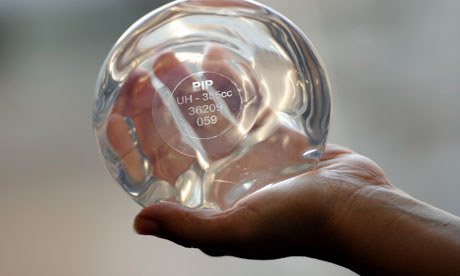
Cosmetic surgery clinics are claiming that the substandard French breast implants given to more than 40,000 women in the UK are safer than has been alleged, saying that data from thousands of patients shows an acceptably low rupture rate.
The Independent Healthcare Advisory Service, which represents all the major cosmetic surgery chains, is calling on the government's expert working group, which begins its investigation on Wednesday, to look carefully at new figures it has obtained from an audit of all its members.
The figures, from thousands of patients, show a rupture rate within the accepted norm of 1%-2%, says the IHAS. The organisation is publicly distancing itself from the figures supplied before Christmas by Transform, an IHAS member and one of the biggest cosmetic surgery chains. Transform reported a rupture rate of around 7%, but from a group of around 100 clients, triggering the government inquiry.
"It is vital for patients' physical and mental wellbeing that policy is based upon clear and reliable evidence," said IHAS director Sally Taber. "We are concerned that recent reports on rupture rates do not give a true reflection of the situation and are misleading.
"Following an audit of our members, which includes data on thousands of patients from leading groups including Transform, The Harley Medical Group, Spire Healthcare, BMI Hospitals and The Hospital Group, we can confirm that the average rupture rates reported for PIP implants is within the industry standard of 1%-2%."
The IHAS had submitted its evidence to the working group convened by health secretary Andrew Lansley and chaired by NHS medical director Sir Bruce Keogh to investigate the safety of the breast implants made by Poly Implant Prosthese (PIP), a French company in the south of France that was shut down in 2010. It has also given the data to the UK regulator, the Medicines and Healthcare Products Regulatory Authority, "to ensure they have proper data with which to review the situation, rather than relying on the small sample of just 100 patients provided by Transform, which has been taken out of context," said Taber.
"Our findings have been backed up by reports from nine other countries that have used PIP implants. We strongly urge the investigation team to conduct a thorough evidence-based audit before making any decisions on next steps."
The claims from the cosmetic surgery clinics come as the French government ordered its own inquiry into how PIP managed to get around the regulators and supply substandard implants, filled with industrial-grade silicone rather than medical-grade, to somewhere between 300,000 and 400,000 women in 65 countries.
Laboratory examination of the implants commissioned by the radio station RTL is said to have revealed they also contained other industrial chemicals. André Picot, the toxicologist who carried out the research, is quoted as saying that offering such products for insertion in the human body was "near criminal".
"All the elements now suggest that the gel [used in PIP's implants] was truly contaminated," French health minister Xavier Bertrand told France 2 television.
"How was this not detected by checks?" he asked. "I want to know everything... I have asked for investigations at the Directorate General of Health and (health safety agency) to know what happened, how these checks were done."
There are only two suppliers of medical-grade silicone worldwide and it is expensive. PIP was making very cheap implants and selling in bulk. One of the company's suppliers has confirmed publicly that it sold silicone intended only for industrial uses to PIP.
"All the specifications of the product ordered from us correspond to industrial material," Pierre Gaches, head of the Toulouse-based company Gaches Chimie, told French journalists. He added that his company supplied PIP with industrial-grade silicone since the early 2000s but that PIP had "never given us any information on how it planned to use" the material.
Chantal Jouanno, a member of France's Sénat, the upper house of parliament, and a former sports minister, called for a parliamentary commission to be set up as soon as possible to look into the scandal. The PIP implants carried the CE-mark of quality assurance, which is dependent in the UK on regular visits to the plant and checks on the materials by MHRA inspectors.
That raises questions about the rigour of the quality assurance processes in France.
The French government has advised the estimated 30,000 women in France with PIP implants to have them removed but insisted this was a non-urgent "preventative" measure. British plastic surgeons have also called for the implants to be removed, saying that women will suffer discomfort if they rupture and great anxiety whether they do or not. However, if the IHAS figures showing a low rupture rate are confirmed, the expert group is unlikely to recommend routine removal, because there are risks to any surgery.
The Department of Health confirmed that the health secretary met Sir Bruce Keogh, the chief medical officer, Sally Davies, and the MHRA on Tuesdayto discuss the latest developments. It also said: "The expert group will meet tomorrow to discuss the preliminary findings on PIP breast implants."

